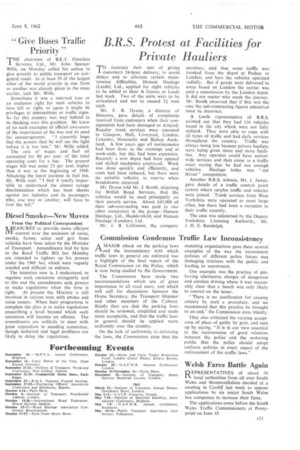B.R.S. Protest at Facilities for
Page 25

If you've noticed an error in this article please click here to report it so we can fix it.
Private Hauliers
TO maintain their aim of giving customers 24-hour delivery, to avoid delays and to alleviate certain maintenance difficulties, Hanson Haulage (Leeds), Ltd., applied for eight vehicles to be added to their A licence at Leeds last week. Two of the units were to be articulated and not to exceed 5i tons each.
Mr. F. B. Dyson, a director of HansOns, gave details of complaints received from customers when their consignments had been damaged or delayed. Regular trunk services were operated to Glasgow, Hull, Liverpool, London, Leicester, Newcastle and Bishop Auckland. A few years ago all maintenance had been done in the evenings and at week-ends, but this had been expensive. Recently a new depot had been opened and skilled mechanics employed. Work was done quickly and efficiently, and costs had been reduced, but there were no suitable vehicles in reserve when breakdowns occurred.
Mr. Dyson told Mr. J. Booth, objecting for British Road Services, that the vehicles would be used principally on their parcels service. About £45,000 of their sub-contracting was paid to two other companies in the group—Hanson Haulage, Ltd., Huddersfield, and Hanson Haulage (London), Ltd.
Mr. J. B. Collinson, the company secretary, said that some traffic was trunked from the depot at Pudsey to London, and here the vehicles operated radially. But if goods were delivered to areas based on London the carrier was paid a commission by the London depot. It did not matter who made the journey. Mr. Booth observed that if this was the case the sub-contracting figures submitted must be incorrect.
A Leeds representative of B.R.S. pointed out that they had 116 vehicles based in the city which were not fully utilized. They were able to cope with all types of traffic and had daily services throughout the country. Traffic was always being lost because private hauliers were being given more and more facilities. Any operator could have nationwide services and then come to a traffic court saying that he had not enough vehicles. Haulage today was "cut throat" competition.
Another B.R.S. witness, Mr. J. James, gave details of a traffic control point system where surplus traffic and vehicles were joined. Trunk services from West Yorkshire were operated to most large cities, but there had been a recession in their traffic recently.
The case was adjourned by the Deputy Yorkshire Licensing Authority, Mr. J. H. E. Randolph.




































































































